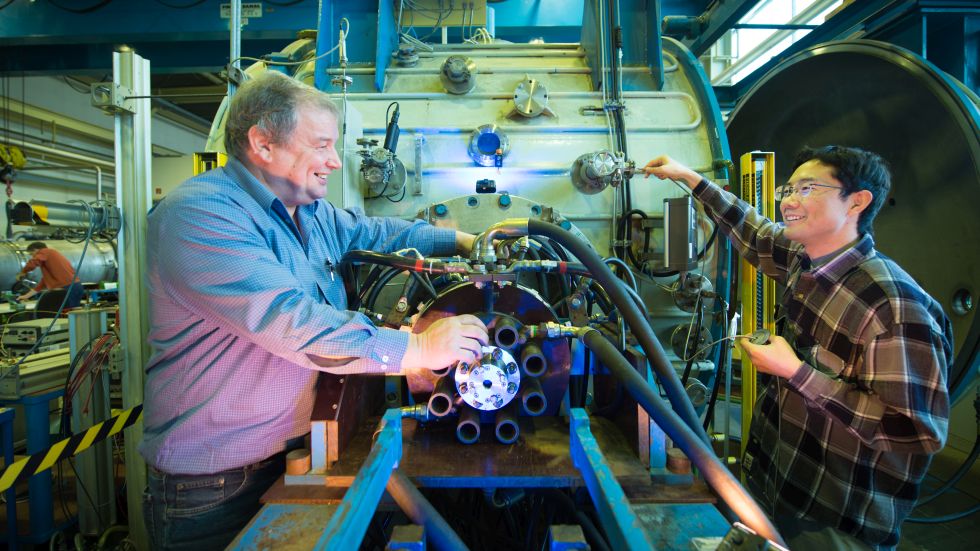Support making RiG more international!
Start SurveySupport making "Research in Germany" more international! Your expertise and commitment are the key to the further development of promoting the German research landscape. We invite you to take part in our online survey and share your valuable experiences and opinions. Duration: 7-10 min.
Please start the survey at the end of your visit.
Leading a research group
Are you an exceptionally qualified researcher with several years of research experience? Becoming the leader of a research group will enable you to realise your own research project and develop your management skills.
If you are not yet eligible to be appointed as a professor, this position will enable you to qualify for a professorship or another leadership position.

Qualifications and application
What is expected of a future research group leader? What does the application procedure involve? You will find answers to these and other questions here:
You will usually have to meet the following requirements to become the leader of a research group:
-
You are already a university teacher or experienced postdoctoral researcher and are working permanently or temporarily at a university institute or a non-university research institution
-
You have acquired several years of (international) research experience after completing your doctorate
-
You have outstanding subject competence
-
You have an idea for your own outstanding research project
-
You have published ambitious papers in internationally prestigious journals.
The requirements for an application can differ depending on the status of the position, as well as on the state and institute involved. Positions are advertised either by the institutes themselves, the participating universities or research organisations. You should pay attention to the following points:
-
In the case of open research groups, you will have to submit your own individual project proposal
-
Applications frequently have to be submitted in English
-
In many cases, applications can only be made online using a special application portal
There can also be differences in the selection procedure. As a rule, however, it involves several steps:
-
Normally, a special committee makes a preliminary selection of applicants who will be invited to a selection symposium or a personal interview
-
Later, this committee makes a recommendation
-
If necessary, external assessments are requested
-
The final decision is made by the management of the research organisation or the university on the basis of the recommendation
Responsibilities and salary
Leadership of a research group is a responsible position. What kinds of duties await you? What possibilities will be available to you? How high is the salary? Find out here:
- As the leader of a research group, you determine the direction of research. You contribute not only to the conceptual planning, but also to the practical realisation of the research project
- You mediate between the management committee and research staff and contribute to the training of early career researchers and, if necessary, to the teaching programme of the institute
- You have your own human resources and equipment budget, which enables you to realise an independent research project and lead a team of doctoral students and postdoctoral researchers
Research groups are usually very well-resourced and have access to a generous budget. And you will use the infrastructure and the administration of the institute at which you are based.
As a rule, they are funded for a period of three to five years. If necessary, funding can be extended.
The remuneration of research group leaders can vary considerably because it depends on the successful candidate’s qualifications and the grouping of the position and whether it is based on the relevant state collective agreement for civil service employees or W pay scale (for researchers).
Specifically, this can mean that the basic starting salary for the leader of a research group can correspond to that of a qualified postdoctoral researcher. It is then roughly 6,200 euros per month gross.
If you meet the requirements for appointment as a university professor or already hold a university professorship, as a rule you will be paid according to the W pay scale, a salary scale for scholars. (Here you will find more information: Professorship at a university > Salary). Depending on the grouping of the higher education institution or the institute, remuneration will be paid according to the W2 or W3 scale.
- According to the W2 scale, the monthly gross basic starting salary is between 5,400 euros and 6,700 euros
- If a position is paid according to W3, the monthly gross basic starting salary rises to between 6,500 euros and 7,600 euros
- The basic salary can be supplemented by special performance- and function-related payments
However, research group leaders can also be financed out of third-party funds. Although salaries are then usually based on the collective agreements, they can deviate from them.
Please bear in mind that deductions are made from gross monthly salary to cover taxes and possibly also social contributions for medical, unemployment and retirement pension insurance. These contributions enable you to acquire rights to the excellent benefits of the German social security system.
Job search & funding
Research projects and the associated positions for research group leaders are also financed by various funding organisations and foundations. But where are the jobs advertised? And what funding programmes are available? Here you will find more information:
Find a job
We help you navigate through the large number of job portals that specialise in openings for academics and scientists. These are some of the sites that may get you started.

Funding & awards
Can you win people over with your expertise, experience and research ideas? German research funding organisations award prizes and fellowships to support international researchers.
